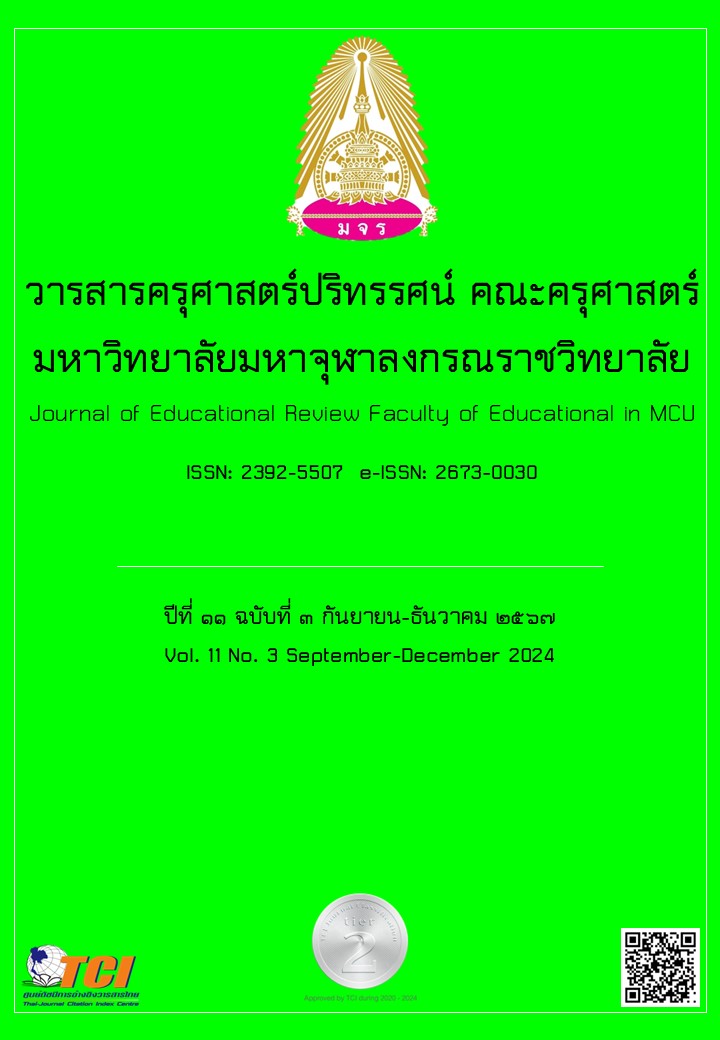THE EFFECTS OF PROBLEM-BASED LEARNING ON PROBLEM SOLVING ABILITIES AND ATTITUDES TOWARD MATHEMATICS SUBJECT OF MATHAYOMSUKSA 6 STUDENTS
Main Article Content
Abstract
The purposes of this research were 1) to compare the problem-solving abilities of Mathayomsuksa 6 students before and after learning by problem-based learning, 2) to compare the problem-solving abilities of Mathayomsuksa 6 students after learning by problem-based learning between students with different academic performance, 3) to study the attitude towards learning Mathematics of Mathayomsuksa 6 students after learning by problem-based learning and 4) to compare the attitude towards learning Mathematics of Mathayomsuksa 6 students after learning by problem-based learning between students with different academic performance. This research was an experimental research based on one-group pretest-posttest design. The research instruments of this research included 1) lesson plans according to problem-based learning about Basic Principles of Counting and Probability, 2) measurement of problem-solving ability about Basic Principles of Counting and Probability and 3) the attitude questionnaire about learning Mathematics. Results showed that 1) Mathayomsuksa 6 students after learning by problem-based learning had the problem-solving ability after learning higher than before learning with statistically significance at the .05 level. 2) Mathayomsuksa 6 students with different academic achievement had the different of problem-solving ability after learning by problem-based learning with statistically significance at the .05 level. 3) The attitude towards learning Mathematics the problem-based learning of Mathayomsuksa 6 students was at the good level and 4) Mathayomsuksa 6 students with different academic achievements had a different attitude toward learning Mathematics after learning by problem-based learning with statistically significance at the .05 level.
Article Details

This work is licensed under a Creative Commons Attribution-NonCommercial-NoDerivatives 4.0 International License.
ทัศนะและความคิดเห็นที่ปรากฏในบทความในวารสารฉบับนี้ถือเป็นความรับผิดชอบของผู้เขียนบทความนั้นเพียงผู้เดียว และไม่ถือเป็นทัศนะและความรับผิดชอบของกองบรรณาธิการ
กองบรรณาธิการขอสงวนสิทธิ์ในการคัดเลือกบทความลงตีพิมพ์และจะแจ้งให้เจ้าของบทความทราบหลังจากผู้ประเมินบทความตรวจอ่านบทความแล้ว
ต้นฉบับที่ได้รับการตีพิมพ์ในวารสารครุศาสตร์ปริทรรศน์ คณะครุศาสตร์ มหาวิทยาลัยมหาจุฬาลงกรณราชวิทยาลัย ถือเป็นกรรมสิทธิ์ของคณะครุศาสตร์ มหาวิทยาลัยมหาจุฬาลงกรณราชวิทยาลัย ห้ามนำข้อความทั้งหมดหรือบางส่วนไปพิมพ์ซ้ำ เว้นเสียแต่ว่าจะได้รับอนุญาตจากมหาวิทยาลัยฯ เป็นลายลักษณ์อักษร
References
กรกนก คำเพชร. (2556). ผลของการฝึกประสบการณ์การเรียนรู้โดยใช้ปัญหาเป็นฐานร่วมกับการเรียนรู้แบบ SSCS ที่มีต่อผลสัมฤทธิ์ทางการเรียน ความสามารถในการแก้ปัญหาและเจตคติต่อวิชาคณิตศาสตร์ ของนักเรียนชั้นมัธยมศึกษาปีที่ 4. วิทยานิพนธ์ครุศาสตรมหาบัณฑิต. มหาวิทยาลัยราชภัฏสกลนคร.
กัญจน์วิภา ใบกุหลาบ. (2562). ผลการจัดการเรียนรู้โดยใช้ปัญหาเป็นฐานที่มีต่อความสามารถในการแก้ปัญหาทางคณิตศาสตร์และผลสัมฤทธิ์ทางการเรียนคณิตศาสตร์ เรื่องสมการของนักเรียนชั้นประถมศึกษาปีที่ 6. วิทยานิพนธ์ครุศาสตรมหาบัณฑิต. มหาวิทยาลัยราชภัฏวไลยอลงกรณ์.
ขจรศักดิ์ จ่าไทยสงค์, โกมินทร์ บุญชู และวิโรจน์ ตั้งวังสกุล. (2560). การศึกษาผลสัมฤทธิ์ทางการเรียนคณิตศาสตร์ โดยการใช้การจัดการเรียนรู้แบบใช้ปัญหาเป็นฐานของนักเรียนชั้นมัธยมศึกษาปีที่ 1. วิทยานิพนธ์ครุศาสตรมหาบัณฑิต. มหาวิทยาลัยราชภัฏกำแพงเพชร.
จิรนันท์ พึ่งกลั่น. (2555). ผลของการจัดกิจกรรมการจัดการเรียนรู้โดยใช้ปัญหาเป็นฐานที่มีต่อความสามารถในการแก้ปัญหาทางคณิตศาสตร์ของนักเรียนชั้นมัธยมศึกษาปีที่ 3 โรงเรียนบ้านค่าย จังหวัดระยอง. วิทยานิพนธ์ศึกษาศาสตรมหาบัณฑิต. มหาวิทยาลัยเกษตรศาสตร์.
ชลดา บุญแสน. (2562). การพัฒนาความสามารถในการแก้ปัญหาทางคณิตศาสตร์ด้วยการจัดการเรียนรู้โดยใช้ปัญหาเป็นฐาน (Problem-Based Learning) เรื่องกราฟและความสัมพันธ์เชิงเส้น ของนักเรียนชั้นมัธยมศึกษาปีที่ 1. วิทยานิพนธ์ครุศาสตรมหาบัณฑิต. มหาวิทยาลัยราชภัฏมหาสารคาม.
ชัยวัฒน์ สุทธิรัตน์. (2561). 80 นวัตกรรมการจัดการเรียนรู้ที่เน้นนักเรียนเป็นสำคัญ. พิมพ์ครั้งที่ 8. นนทบุรี: พีบาลานซ์ดีไซด์แอนปริ้นติ้ง.
ทิศนา แขมมณี. (2561). ศาสตร์การสอน องค์ความรู้เพื่อการจัดกระบวนการเรียนรู้ที่มีประสิทธิภาพ. พิมพ์ครั้งที่ 22. กรุงเทพมหานคร: สำนักพิมพ์แห่งจุฬาลงกรณ์มหาวิทยาลัย.
เพ็ญศรี เลิศเกียรติวิทยา และสิฎฐาการ ชูทรัพย์. (2547). หนังสือเรียน รายวิชาพื้นฐานงานอาชีพ 4-6. กรุงเทพมหานคร: เอมพันธ์.
ไพศาล วรคำ. (2558). การวิจัยทางการศึกษา. พิมพ์ครั้งที่ 7. มหาสารคาม: ตักสิลาการพิมพ์.
ไพศาล สุวรรณน้อย. (2559). การเรียนรู้โดยใช้ปัญหาเป็นฐาน (Problem-based Learning: PBL). แหล่งที่มา https://ph.kku.ac.th/thai/images/file/km/pbl-he-58.1.pdf สืบค้นเมื่อ 20 ต.ค. 2565.
วรวิทย์ ตันฑนะเทวินทร์ และคณะ. (2563). การเรียนรู้โดยใช้ปัญหาเป็นฐาน (Problem–based Learning: PBL). แหล่งที่มา http://www.casjournal.cas.ac.th/admin/filedocuments/1608372597-ED031-T(29-36).pdf สืบค้นเมื่อ 20 มิ.ย. 2563.
วริญญา ไชโยธา. (2558). การพัฒนาความสามารถในการแก้ปัญหา เรื่องเซต วิชาคณิตศาสตร์พื้นฐานโดยการจัดการเรียนรู้แบบใช้ปัญหาเป็นฐานของนักเรียนชั้นมัธยมศึกษาปีที่ 4 โรงเรียนปทุมราชวงศา สำนักงานเขตพื้นที่การศึกษามัธยมศึกษา เขต 29. วิทยานิพนธ์ครุศาสตรมหาบัณฑิต. มหาวิทยาลัยราชภัฏอุบลราชธานี.
สถาบันทดสอบทางการศึกษาแห่งชาติ (องค์การมหาชน). (2564). สรุปผลการทดสอบทางการศึกษาระดับชาติขั้นพื้นฐาน (O-NET) ชั้นมัธยมศึกษาปีที่ 6 ปีการศึกษา 2564. แหล่งที่มา http://www.newonetresult.niets.or.th/AnnouncementWeb/MainSch/MainSch.aspx สืบค้นเมื่อ 20 เม.ย. 2565.
สถาบันส่งเสริมการสอนวิทยาศาสตร์และเทคโนโลยี. (2560). ตัวชี้วัดและสาระการเรียนรู้แกนกลาง กลุ่มสาระการเรียนรู้คณิตศาสตร์ (ฉบับปรับปรุง พ.ศ. 2560). กรุงเทพมหานคร: สถาบันส่งเสริมการสอนวิทยาศาสตร์และเทคโนโลยี.
สิริพร ทิพย์คง. (2545). หลักสูตรและการสอนคณิตศาสตร์. กรุงเทพมหานคร: พัฒนาคุณภาพวิชาการ.
สุคนธ์ สินธพานนท์. (2558). การจัดการเรียนรู้ของครูยุคใหม่ เพื่อพัฒนาทักษะของผู้เรียน ในศตวรรษที่ 21. กรุงเทพมหานคร: 9119 เทคนิคพริ้นติ้ง.
อาภรณ์ ใจเที่ยง. (2550). หลักการสอน (ฉบับปรับปรุง). พิมพ์ครั้งที่ 4. กรุงเทพมหานคร: โอ.เอส.พริ้นติ้ง.
Amalia, E., Surya E. & Syahputra, E. (2017). The Effectiveness of Using Problem-Based Learning (PBL) in Mathematics Problem Solving Ability for Junior high school students. Magister’s thesis (Education). State University of Medan.
Delisle, Robert. (1997). How to Use Problem-Based Learning in the Classroom. Alexandria: ASCD.
Eric, C. C. M. (2011). Primary 6 Student’s Attitudes towards Mathematical Problem-Solving in a Problem-Based Learning. The mathematics Educator. 13(1). 15-31.
Polya, G. (1973). How to Solve It: A new aspect of Mathematical Method. 2nd ed. Princeton, New Jersey: Princeton University Press.


